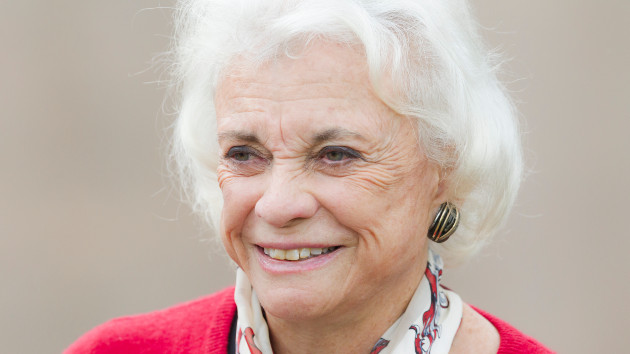(WASHINGTON) — Former Supreme Court Justice Sandra Day O’Connor will be memorialized this week in the nation’s capital.
O’Connor, who died on Dec. 1 at age 93, is lying in repose in the Great Hall of the Supreme Court on Monday, where the public will have the ability to pay respects.
Supreme Court police officers served on the casket team, and O’Connor’s seven grandchildren served as honorary pallbearers.
All nine current Supreme Court justices attended Monday’s service, during which Justice Sonia Sotomayor and Rev. Jane E. Fahey, who served as a law clerk for O’Connor in the 1980s, delivered remarks. Both women described O’Connor as a trailblazer and friend, and remarked in detail about O’Connor’s congeniality on the court.
“She was devoted to making a better world, and that’s what she did,” Sotomayor said, adding that O’Connor was her “life role model.”
Sotomayor also discussed O’Connor’s impact on the law in her nearly 700 opinions from the bench, saying she approached every case with “incredible thoughtfulness and sought to arrive at a practical conclusion.”
“The nation was well served by the steady hand and intellect of a justice who never lost sight of how the law affected ordinary people,” she said.
A 1999 portrait of O’Connor was on display while she lied in repose.
Vice President Kamala Harris and Second Gentleman visited the Supreme Court to pay their respects, according to her office.
“I first met Justice O’Connor years ago. Like so many who knew her, I will always remember her kindness, intelligence, and deep love for our country,” Harris said in a statement first marking O’Connor’s passing.
O’Connor’s funeral will be held at the Washington National Cathedral on Tuesday. The service will not be open to the public, but journalists covering the event will be in attendance.
President Joe Biden and Chief Justice John Roberts will give eulogies at the funeral as will O’Connor’s son, Jay.
“Justice O’Connor’s indomitable spirit and unwavering commitment to justice made her a pioneer and an inspiration to generations, breaking barriers and leaving an enduring mark on the nation’s highest court,” said Randolph Marshall Hollerith, dean of the cathedral, which has hosted multiple former presidents’ funerals and other notable memorials. “The Cathedral has been blessed by her many years of service and worship.”
O’Connor’s death was announced by the Supreme Court, citing “complications related to advanced dementia, probably Alzheimer’s, and a respiratory illness.”
She was named as the high court’s first female jurist by then-President Ronald Reagan in 1981.
The former justice, who said during her confirmation hearing that “the proper role of the judiciary is one of interpreting and applying the law — not making it,” was often a swing vote on the court, going on to write landmark opinions on abortion access and affirmative action. More controversially, she was also a key vote in the ruling that allowed George W. Bush to win the 2000 presidential election.
O’Connor later wrote that being the first female jurist was a challenge, but that she was “grateful” for opening a door for other women.
“The first woman on the Court was carefully scrutinized by the press, the government, the lawyers, and the public,” O’Connor wrote in her 2013 history of the Supreme Court. “It is not always comfortable to be the object of so much attention. But the appointment of a woman to the Court opened countless doors to women all across the country. For that I am grateful.”
ABC News’ Molly Nagle contributed to this report.
Copyright © 2023, ABC Audio. All rights reserved.












